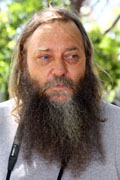Prof. Willem Boshoff joins Department of Fine Arts
 |
| Prof. Willem Boshoff |
Prof. Willem Boshoff, one of South Africa’s most established artists, has joined the Department of Fine Arts as a mentor for postgraduate students. Prof. Boshoff, whose work has been shown extensively in South Africa and internationally, will serve as mentor and resident artist in the department.
Prof. Boshoff made his mark at the university in 2011 when his Thinking Stone sculpture, one of sixteen artworks commissioned by the Sculpture-on-Campus project, was installed near the Main Building. The "Black Belfast " granite stone, situated next to the H vd Merwe Scholtz Hall, weighs approximately 20 ton and, to date,is the largest of the artworks funded by the National Lottery Distribution Trust fund.
Mr Ben Botma, Head of the Department of Fine Arts, says Prof. Boshoff, who is based in Gauteng, will work on the Bloemfontein Campus for certain months of the year. “As an artist he is extremely productive and has an impressive international exhibition programme. As a result he has a good overview of what happens in the most important museums and contemporary galleries. This information and insight can be shared with students with great success.”
Mr Botma says although the mentorship is aimed at postgraduate students, Prof. Boshoff’s presence and obsessive work habits will also motivate and inspire undergraduate students. “Willem is very popular as external examiner and moderator at other universities and he has a good perspective of what happens at the major universities”.